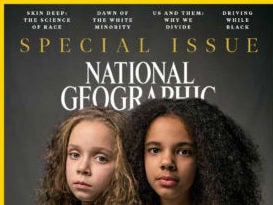
National Geographic editor-in-chief Susan Goldberg has admitted that the title’s past coverage was “racist”.
The US magazine’s April edition is dedicated to race and marks 50 years since the assassination of Martin Luther King.
In an editorial, Goldberg said: “For decades, our coverage was racist. To rise above our past, we must acknowledge it”.
She said it hurt to share “appalling” stories from the magazine’s history.
As part of the issue, University of Virginia historian John Edwin Mason was hired to investigate the magazine’s coverage of people of colour in the US and abroad.
Mason found that until the 1970’s, National Geographic “all but ignored” people of colour in the United States and rarely acknowledged them beyond “labourers or domestic workers”.
The magazine often ran photos of “uncivilised” natives fascinated by “civilised” western technology, he said, adding that the magazine “did little to push its readers beyond the stereotypes ingrained in white American culture”.
“Natives” around the world were featured as “exotics, famously and frequently unclothed, happy hunters, noble savages—every type of cliche,” he said.
Comparing two stories about South Africa from 1962 and 1977, Mason found that the earlier article “barely mentions any problems” despite the ongoing issues of apartheid.
The 1977 piece on the other hand “acknowledges the oppression” amid the US civil rights era.
Our April issue is devoted to exploring race—how it defines, separates and unites us. Read the story behind the cover: https://t.co/PPTVg3UpM8 pic.twitter.com/5kunxfDrHt
— National Geographic (@NatGeo) March 12, 2018
Mason said: “Segregation was the way it was. National Geographic wasn’t teaching as much as reinforcing messages they already received and doing so in a magazine that had tremendous authority.
“National Geographic comes into existence [in 1888] at the height of colonialism, and the world was divided into the colonisers and the colonised.
“That was a colour line and National Geographic was reflecting that view of the world.”
Goldberg said she was left “speechless” by some of the material that was uncovered in the National Geographic’s archives.
She mentioned a 1916 photo of Australian aborigines from the magazine captioned: “South Australian Blackfellows: These savages rank lowest in intelligence of all human beings.”
Said Goldberg: “For us this issue also provided an important opportunity to look at our own efforts to illuminate the human journey, a core part of our mission for 130 years.
“I want a future editor of National Geographic to look back at our coverage with pride—not only about the stories we decided to tell and how we told them but about the diverse group of writers, editors, and photographers behind the work.”
Email pged@pressgazette.co.uk to point out mistakes, provide story tips or send in a letter for publication on our "Letters Page" blog
